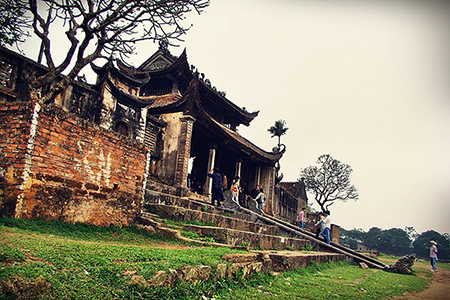In the scorching heat of the 5th and 6th lunar months in Hanoi people like to quench their thirst by eating at mealtime a plate of boiled convolvulus and drinking the water in which it was cooked, flavoured with lemon juice. To make this traditional dish nothing is better material than the convolvulus (rau muong) from Son Tay.
Son Tay (literally "the mountainous west"), a 500-year old province lying west of Hanoi, was part of the region called Xu Doai (literally "west country") with which it was often confused. Located at the apex of the triangular delta of the Red River, Xu Doai comprises two parts: the north-east, with fertile plains, and the south-west, with an upland landscape of barren hills and mountains. It is this arid region which seems to have shaped the character of the inhabitants, who have a reputation of poverty, diligence, stubbornness and toughness.

Some spitefully mock the women of west country for their "poverty and plain Locks". A popular song satirically points to their "bodices with holes as big as those in a woven bamboo basket, to their teeth, so awkwardly black lacquered that they took like stones of nhot cherries, as well as to their bow legs". Another popular song hints at the material penury and peculiar accent of the population of west country:
"Whose voice is that, is it of someone from west country Where people feed on sweet potato, rather than rice?"
The dialects spoken in west country are striking for their heavy, harsh accents, which recall those of Central Vietnam; some believe that this is due to the water people drink there. Many local words differ from the current vocabulary used in the country. Thus an old man is designated by mo, or bo, not cu, an old woman by bu, not ba gia,- sweet potato by khoai deo not khoai lang, etc. This has not prevented young people of west country from showing great love of study and obtaining brilliant results at old triennial examinations.
An original trait of the region is the use of laterite as building material. This gives the walls of the houses a characteristically rough took.
According to the principles of geomancy, the sacred khi (vital breaths) of the universe crystallise in the configuration of the ground of a region, on which they confer a peculiar soul and sensibility and special traits. In this respect the two attributes of west country are Mount Ba Vi ("Three Peaks”) and the river Da ("Black River"). Mount Ba Vi 1218 metres high, stands at the confluence of the Da, the Lo (Clear River) and the Song Hong (Red River), at the entrance to the northern delta. It has three peaks, hence its name; but according to another interpretation, Ba Vi is the popular and distorted translation of Tam Vi (three gods) because the royal certificate kept at the temple built on the central peak mentions "the three senior gods of Mount Tan Vien (Tan Vien Tam Vi Thuong Dang Than). Tan Vien (round as a parasol) is another name of Mount Ba Vi, because of its shapes when viewed from afar. It also designates the resident Mountain God who according to legend protects the population against floods caused by the Water God. The latter each year unleashed floods of the Red River to avenge himself on the Mountain God for obtaining hand of the princess whom he too intended to marry. West country has always been a cradle of greet historical figures: heroes of national independence like Phung Hung (or Bo Cai Dai Vuong) in the 8th century; Ngo Quyen, who put an end to centuries of Chinese domination (938 AD); eminent Buddhist priests like Tu Dao Hanh prominent scholars like Nguyen Truc (12th century), who was honoured with the title of doctor of humanities both in Vietnam and China, Phung Khac Khoan (16th century) a doctor of humanities who brought back from a mission to China an excellent silk- weaving loom, seeds of maize and soya beans; historians of the Phan Huy clan (Phan Huy Chu and Phan Huy Ich, 15th century); the poet rebel Cao Ba Quat (19th century); the forerunner of modern poetry Tan Da (1888-1939) who took the pen name of Tan Da (comprising the word Tin from the name of Mount Tan Vien and Da, from that of river Da) to show his attachment to his native land; the poet Quang Dung (1918-1988), a fighter in the first Resistance War, whose beautiful verses imbued with nostalgia and fantasy are much loved by young people.
Lastly, west country abounds in traditional crafts (vermicelli of Co Do, Minh Tranh, silk of Co Do, Chu Quyen, fans and umbrellas of Chang Thon) and in tourist sites (especially the Chua Thay and Tay Phuong pagodas).



